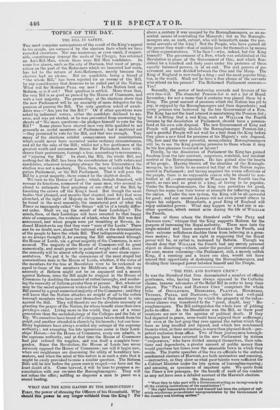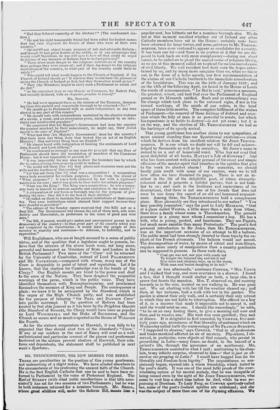"THE PEEL AND DAWSON CREW."
IT was the Standard that thus denominated a number of official gentlemen, who, having been always opposed to the Catholic claims, became advocates of the Relief Bill in order to keep their places. The "PEEL and DAWSON Crew" comprises the whole tribe of GOULBURNS, HERRIESES, PLANTAS, HOLMESES, TWISSES, PEELS, and DAWSONS,—the active and well-paid managers of that machinery by which the property of the indus- trious classes was transferred to the "great, stupid, lazy " Bo- roughmongers. The Bill extinguishes the whole race of jobbing jacks-in-office. As the Dissolution was the Bill, so these poor creatures are now in the agonies of political death. If they had departed in peace, none would have enjoyed their sufferings ; but even at the last gasp they rave against the nation which they have so long insulted and injured, and which has condemned them to what, in their estimation, is worse than physical death—per- petual exclusion from office. Two of these journeymen borough- mongers have been returned to the new Parliament by sixteen " corporators," who have divided amongst themselves, their rela- tions and dependents, a greater amount of public money than would purchase ten times over the miserable town in which they reside. The frantic speeches of the two ex-officials to the sixteen condemned electors of Harwich, are both instructive and amusing, —instructive, as they show us what poor talents were sufficient for a Cabinet Minister under the late system of boronghmongering; and amusing, as specimens of impotent spite. We quote from the Times a few passages, for the benefit of such of our readers as may not have seen a detailed account of the Harwich election.
MR. HERRIES.
"Were they to take part with a Government acting so incongruously to all the existing institutions of the constitution ? " " His right honourable friend and himself had been the subject of infi- nitely mischievous premeditated misrepresentation by the Government of the country and hireling scribes."
" Had they behaved unworthy of the electors ? " [The condemned six- teen.] " He and his right honourable friend had been called the foulest names that had ever disgraced the breasts of those who were of their own country."
" He should not object to any measure of safe and advisable Reform ; and though he had great doubts of the utility, or of any advantages that would result therefrom, he was still open to hem- all that could be urged in defence of any measure of Reform that he hod not yet heard."
" There arose more danger to the religious institutions of the country than perhaps they were aware of ; and if there lay danger to the religious institutions of the country, to what part of the country could there be safety ? " " Who could tell what would happen to the Church of England, if the Church of Ireland should go ? It was true they would have the pleasure of seeing the Church of Ireland go first, but they themselves would go too." " They (the Ministers) hoped to carry such a Parliament as would suit the Bill."
"As the GREATEST MAN IN THE HOUSE OF COMMONS, Sir Robert Peel, had recently declared, with an eloquence peculiar to himself."
MR. DAWSON.
" He had never appeared there as the minion of the Treasury, demand- ing from this ancient and respectable borough to be returned—No ! " " He should go to Parliament with as much independence as any man elected in any part of this empire." " He should vote with independence unstained by the abusive violence of a servile, a venal, and an anonymous press, uninfluenced by an infu- riated and misdirected populace." " He conceived that his Majesty's Government had done the country the greatest mischief, by their unnecessary, he might say, their foolish appeal to the sense of England." What had they (his Majesty's Government) done for the country ? Had there been any thing done that looked like an act of an English Ministry ? Had not every thing been un-English ?" " He almost burst with indignation at hearing the sentiments of Lord John Russell and Lord Althorp." " He condemned as strongly as any man the principle that any Peer of Parliament should have the nomination of members of the Commons House ; but it was impossible to prevent it." " It was impossible for any man to draw the boundary line by which the boundary arising from property could be defined. " He would tell them [the 16] that places and sinecures were not the evils and the burdens of this country."
" Let him ask them [the 16] what was a corporation ? A corporation was a body associated for certain purposes. (Cries from the crowd of What purposes ?' ) It was a body endowed by low with a legitimate succession for ever ; and it was given to those bodies for certain purposes." " What was the King ? The King was a corporation : he was a corpo- rate body in himself to prevent anarchy and confusion in the country." " A corporation of any town or borough was for the purpose of pro- tecting the laws : they did it to the best of their abilities."
" He called on them to maintain the ancient institutions of their coun- try. They were institutions which claimed their support because they were founded on precedent." " The editors of the Sunday papers received that (the Bill) not as a final Bill. The Government had chosen the aid of those men, who were Infidels and Materialists, in preference to the sense of good and wise
men."
" The Bill, if passed, would give undue and unrecognized power to the democracy of the country—to that great part of the country which was not recognized by the Constitution : it would leave the people of this country to anarchy and confusion—to Atheism, to Infidelity, and to
oppression."
Will Englishmen, who are at length aroused to a sense of public virtue, and of the qualities that a legislator ought to possess, be- lieve that the utterers of the above trash were, not long since, powerful and honoured as Ministers of State and leaders in the British Parliament? Two more of the " Crew" will be returned by the University of Cambridge, instead of Lord PALMERSTON and Mr. CAVENDISH,—compared with whom, every one of the Crew is despicable in point of talent and reputation. Let it be known, that the election for Cambridge was in the hands of the Clergy ! Our English monks are blind to the power and deaf to the cries of the Nation. They have despised the respectful warnings of the press, which is the public voice. They have
identified themselves with Boroughmongering, and proclaimed themselves the enemies of King and People. The consequence is
plain : we leave it to be anticipated by the Standard, which is the organ of the High Church party, and was established for the purpose of bringing " the PEEL and DAWSON Crew" into public contempt. If e'the question of Reform had been treated by that able journal as it has been by the Brighton Gazette (the Standard of Sussex), the Clergy would have been as popular as Lord WINCHILSEA and the Duke of RICHMOND, and the Church as secure and as much respected as the throne of WILLIAM the Fourth.
As for the sixteen corporators of Harwich, it was fully to be expected that they should elect two of the Standard's " Crew ." If any of our readers in the east of Essex will send us a well- authenticated and particular account of the places and preferment bestowed on the sixteen present electors of Harwich, their rela- tions and dependents, the statement shall be published in next Week's Spectator.



























 Previous page
Previous page